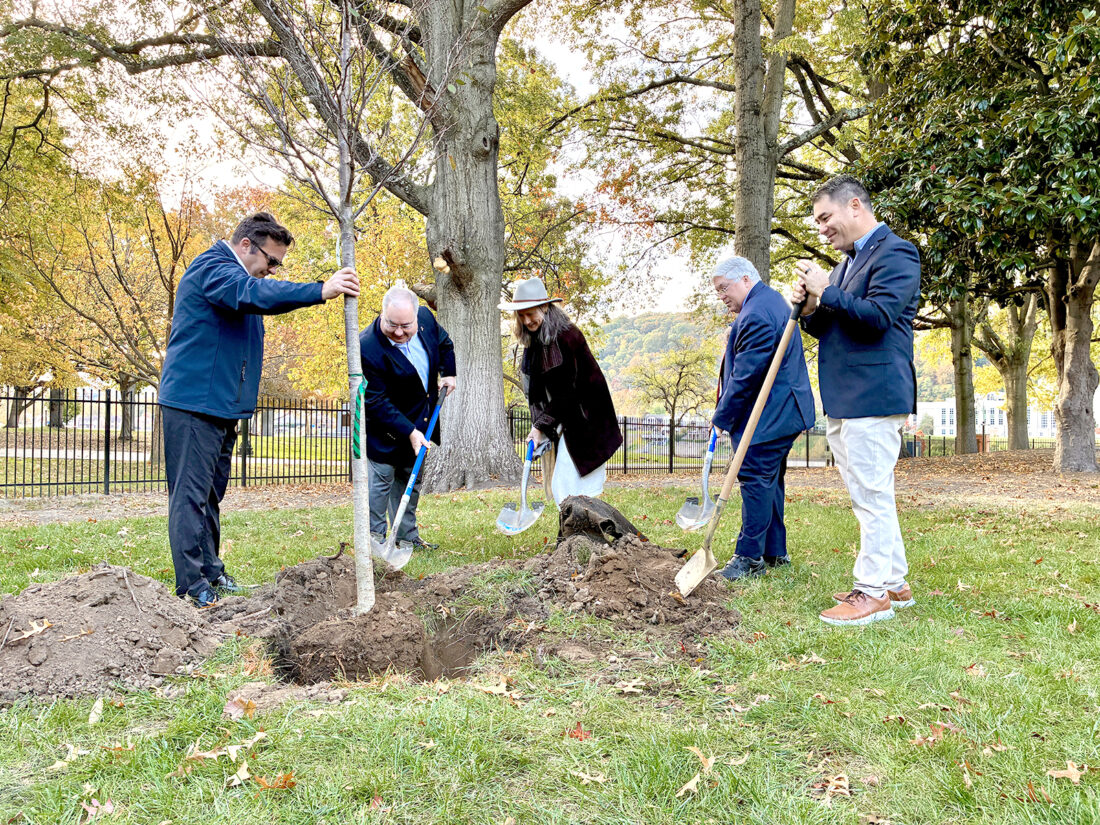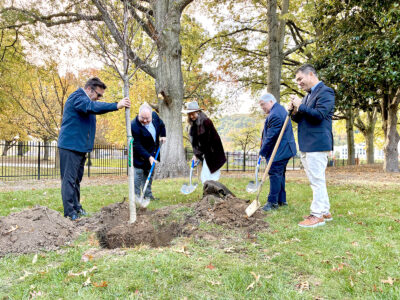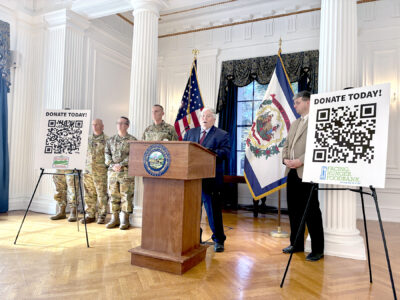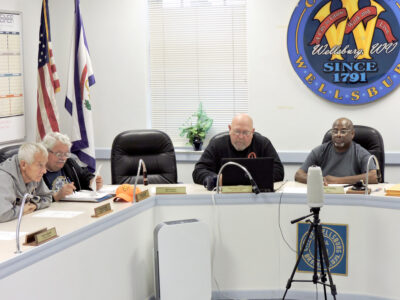Cherry blossom tree planting pays tribute to Japan, 100th anniversary of Governor’s Mansion

COMMEMORATIVE PLANTING — From left, Governor’s Mansion Banquet Supervisor Kevin Comer, state Sen. T. Kevan Bartlett, R-Kanawha; Municipal Beautification Commission Chairwoman Anna Forbes; Gov. Patrick Morrisey; and state Sen. Tom Takubo, R-Kanawha, plant the first of six cherry blossom trees on the grounds of the Governor’s Mansion Tuesday. -- Steven Allen Adams
CHARLESTON — Gov. Patrick Morrisey and first lady Denise Morrisey took part Tuesday in planting several cherry blossom trees on the grounds of the Governor’s Mansion, paying tribute to West Virginia’s friendship with Japan, the 100th anniversary of the Governor’s Mansion and a tree-planting effort across the capital city.
The Morriseys were joined Tuesday morning at the Governor’s Mansion by several lawmakers, and Anna Forbes, chairwoman of the City of Charleston’s Municipal Beautification Commission, for the ceremonial planting of one of six cherry blossom trees.
“They’re going to bring some new life, some new color and more pride to our capital city,” Morrisey said.
The cherry blossom trees were donated to the Governor’s Mansion by the City of Charleston and several groups and individuals, including the Jacobson Foundation, the Daywood Foundation, the Kanawha Garden Club, Rev. Jack Lipphardt and Lisa Barnhart Reed. The trees sprang from seeds of the famous Tidal Basin cherry blossom trees in Washington, D.C., donated to the nation by the government of Japan.
West Virginia has a long relationship with Japan, dating back to former Gov. Jay Rockefeller, who lived in Japan for three years for post-college studies. Connections Rockefeller made as governor and later U.S. senator led to Toyota coming to the state, as well as more than 20 other companies. West Virginia also maintains an economic development office in Japan.
“Here in West Virginia, we have a very proud history with Japan, a country whose friendship and partnership with West Virginia continues to grow stronger every single year,” Morrisey said. “As one of our largest trading partners, Japanese companies have invested in our communities, created jobs and shared in our vision for economic success. … We are grateful for our country’s and our state’s friendship with Japan, and these trees will stand as a living tribute to that respect and collaboration.”
“This is an absolutely beautiful idea,” said state Sen. Tom Takubo, R-Kanawha, who comes from Japanese lineage. “I know that we have a rich investment that started back 30 years ago with Japan. We have a business office in Japan. And we have, I think, over 20-plus companies here. So, I’m sure this will mean a lot to them too.”
The planting of the cherry blossom trees also coincides with the 100th anniversary of the Governor’s Mansion. The Georgian colonial residence was completed in 1925 by architect Walter F. Martens, according to the West Virginia Encyclopedia.
“As we commemorate the 100th anniversary of the mansion, I think it’s important to note so much of the rich history that went into making all this happen,” Morrisey said.
The cherry blossom trees are part of an effort to plant more than 1,000 flowering trees throughout Charleston. Last week, Mayor Amy Shuler Goodwin and the city’s Municipal Beautification Commission held the initial tree-planting ceremony at the City Building for the Appalachian Spring Project, which will plant flowering trees and other trees around the city over the next three years.
“These trees are a gift from the city to the state, our beautiful State of West Virginia,” Forbes said. “I want to also emphasize that a thousand tree sounds like a lot, but I’m hoping it’s just the beginning. Hopefully, additional phases will be added.
“The goal of this project is obviously beautification, but it’s a strategic beautification,” Forbes continued. “It’s beautification that is aimed at generating economic upturn, increasing tourism, spurring economic development, growing our community, fostering important conservation concerns and improving the general well-being of our citizens. The government can’t do this alone. The private sector, public sector endeavor is important.”



